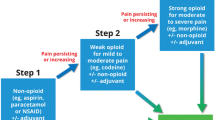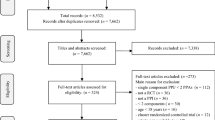Abstract
Purpose
African-American women with breast cancer face significant disparities, including high levels of pain. Depressive symptoms and self-efficacy for pain management impact how women with breast cancer manage pain, yet little is known about how these variables relate to pain specifically for African-American women with breast cancer.
Methods
Baseline linear regression analyses were conducted using a sample of women (n = 98) with stage I–III breast cancer identifying as Black or African-American who were part of a larger intervention trial. Linear regressions explored the effect of depressive symptoms on pain (i.e., severity and interference), and the effect of self-efficacy for pain management on pain. Covariates were age (M = 57.22, SD = 10.76), cancer stage (50% = stage 1), and education level (36% = some college).
Results
Participants reported moderate levels of pain severity and interference. Higher depressive symptoms were related to both higher pain severity and interference; (B = 0.06, p < 0.01, 95% CI [0.02,0.09]) and (B = 0.13, p < 0.001, 95% CI [0.09, 0.17]) respectively. Likewise, lower self-efficacy for pain management was also related to both higher pain severity and interference; (B = − 0.04, p < 0.001, 95% CI [− 0.05, − 0.02]) and (B = − 0.06, p < 0.001, 95% CI [− 0.08, − 0.04]) respectively. Women reporting less than a high school diploma endorsed significantly higher pain severity and interference than women reporting some college. Age and cancer stage were not significantly related to pain.
Conclusion
Pain for African-American women with breast cancer may be influenced by depressive symptoms and self-efficacy for pain management, in addition to other important variables. Attending to better assessment and treatment of depressive symptoms and self-efficacy for pain management may improve outcomes.
Similar content being viewed by others
Data availability
N/A.
Code availability
N/A.
References
DeSantis CE, Ma J, Gaudet MM et al (2019) Breast cancer statistics, 2019. CA Cancer J Clin 69:438–451
Yedjou CG, Tchounwou PB, Payton M et al (2017) Assessing the racial and ethnic disparities in breast cancer mortality in the United States. Int J Environ Res Public Health 14:E486
Green C, Hart-Johnson T, Loeffler D (2011) Cancer-related chronic pain: examining quality of life in diverse cancer survivors. Cancer 117:1994–2003
van den Beuken-van Everdingenvan den M, de Rijke J, Kessels A, Schouten A, van Kleef M, Patijn J (2007) Prevalence of pain in patients with cancer: a systematic review of the past 40 years. Ann Oncol. 18:1437–1449
Shi Q, Smith TG, Michonski JD, Stein KD, Kaw C, Cleeland CS (2011) Symptom burden in cancer survivors 1 year after diagnosis: a report from the American Cancer Society’s Studies of Cancer Survivors. Cancer 117:2779–2790
Maly A, Singh N, Vallerand AH (2018) Experiences of urban African Americans with cancer pain. Pain Manag Nurs 19:72–78
Coughlin SS, Yoo W, Whitehead MS, Smith SA (2015) Advancing breast cancer survivorship among African-American women. Breast Cancer Res Treat 153:253–261
Meghani SH, Polomano RC, Tait RC, Vallerand AH, Anderson KO, Gallagher RM (2012) Advancing a national agenda to eliminate disparities in pain care: directions for health policy, education, practice, and research. Pain Med 13:5–28
Williams F, Thompson E (2017) Disparities in breast cancer stage at diagnosis: importance of race, poverty, and age. J Health Dispar Res Pract 10:34–45
McGee SA, Durham DD, Tse C-K, Millikan RC (2013) Determinants of breast cancer treatment delay differ for African American and White women. Cancer Epidemiol Biomarkers Prev 22:1227–1238
Siddharth S, Sharma D (2018) Racial disparity and triple-negative breast cancer in African-American women: a multifaceted affair between obesity, biology, and socioeconomic determinants. Cancers (Basel) 10:514
Tammemagi CM (2007) Racial/ethnic disparities in breast and gynecologic cancer treatment and outcomes. Curr Opin Obstet Gynecol 19:31–36
Sun V, Borneman T, Piper B, Koczywas M, Ferrell B (2008) Barriers to pain assessment and management in cancer survivorship. J Cancer Surviv 2:65–71
Hoffman KM, Trawalter S, Axt JR, Oliver MN (2016) Racial bias in pain assessment and treatment recommendations, and false beliefs about biological differences between blacks and whites. PNAS 113:4296–4301
Bulls HW, Chu E, Goodin BR et al (2022) Framework for opioid stigma in cancer pain. Pain 163:e182–e189
Yeager KA, Williams B, Bai J et al (2019) Factors related to adherence to opioids in Black patients with cancer pain. J Pain Symptom Manag 57:28–36
Brandão T, Schulz MS, Matos PM (2017) Psychological adjustment after breast cancer: a systematic review of longitudinal studies. Psychooncology 26:917–926
Onitilo AA, Nietert PJ, Egede LE (2006) Effect of depression on all-cause mortality in adults with cancer and differential effects by cancer site. Gen Hosp Psychiatry 28:396–402
Cheruvu VK, Oancea SC (2016) Current depression as a potential barrier to health care utilization in adult cancer survivors. Cancer Epidemiol 44:132–137
Sheppard VB, Llanos AA, de Mendoza AH, Taylor TR, Adams-Campbell LL (2013) Correlates of depressive symptomatology in African American breast cancer patients. J Cancer Surviv 7:292–299
Kang Y, Meghani SH, Bruner DW, Yeager KA (2020) Factors associated with depression in African American patients being treated for cancer pain. Pain Manag Nurs 21:410–415
Hamilton JB, Deal AM, Moore AD, Best NC, Galbraith KV, Muss H (2013) Psychosocial predictors of depression among older African American cancer patients. Oncol Nurs Forum 40:394–402
Sheppard VB, Llanos AA, Hurtado-de-Mendoza A, Taylor TR, Adams-Campbell LL (2013) Correlates of depressive symptomatology in African-American breast cancer patients. J Cancer Surviv 7:292–299
Bamonti P, Moye J, Naik A (2018) Pain is associated with continuing depression in cancer survivors. Psychol Health Med 23:1–14
Shi Q, Michonski J, Stein K, Kaw C, Cleeland C (2011) Symptom burden in cancer survivors 1 year after diagnosis: a report from the American Cancer Society’s Studies of Cancer Survivors. Cancer 117:2779–2790
White LL, Cohen MZ, Berger AM, Kupzyk KA, Bierman PJ (2019) Self-efficacy for management of symptoms and symptom distress in adults with cancer: an integrative review. Oncol Nurs Forum 46:113–128
Somers TJ, Kelleher SA, Westbrook KW et al (2016) A small randomized controlled pilot trial comparing mobile and traditional pain coping skills training protocols for cancer patients with pain. Pain Res Treat 2016:2473629
Sheppard VB, Harper FWK, Davis K, Hirpa F, Makambi K (2014) The importance of contextual factors and age in association with anxiety and depression in Black breast cancer patients. Psychooncology 23:143–150
Watkins CC, Kamara Kanu I, Hamilton JB, Kozachik SL, Gaston-Johansson F (2017) Differences in coping among African American women with breast cancer and triple-negative breast cancer. Oncol Nurs Forum 44:689–702
Kelleher SA, Dorfman CS, Plumb Vilardaga JC et al (2017) Optimizing delivery of a behavioral pain intervention in cancer patients using a sequential multiple assignment randomized trial SMART. Contemp Clin Trials 57:51–57
Fisher HM, Winger JG, Miller SN et al (2021) Relationship between social support, physical symptoms, and depression in women with breast cancer and pain. Support Care Cancer 29:5513–5521
Cleeland C, Ryan K (1995) Pain assessment: global use of the Brief Pain Inventory. Rehabil Oncol 1995(13):29–30
Carleton RN, Thibodeau MA, Teale MJN et al (2013) The center for epidemiologic studies depression scale: a review with a theoretical and empirical examination of item content and factor structure. PLoS ONE 8:e58067
Anderson KO, Dowds BN, Pelletz RE, Edwards TW, Peeters-Asdourian C (1995) Development and initial validation of a scale to measure self-efficacy beliefs in patients with chronic pain. Pain 63:77–83
George D, Mallery M (2010) SPSS for Windows step by step: a simple guide and reference, 17.0 update, 10th edn. Pearson, Boston
Yee MK, Sereika SM, Bender CM, Brufsky AM, Connolly MC, Rosenzweig MQ (2017) Symptom incidence, distress, cancer-related distress, and adherence to chemotherapy among African American women with breast cancer. Cancer 123:2061–2069
Kelleher SA, Fisher HM, Winger JG et al (2021) Feasibility, engagement, and acceptability of a behavioral pain management intervention for colorectal cancer survivors with pain and psychological distress: data from a pilot randomized controlled trial. Support Care Cancer 29:5361–5369
Dorfman CS, Kelleher SA, Winger JG et al (2019) Development and pilot testing of an mHealth behavioral cancer pain protocol for medically underserved communities. J Psychosoc Oncol 37:335–349
Vallerand AH, Templin TN, Hasenau SM, Maly A (2019) Modifiable pathways from pain to functional status: confirmatory baseline results from a randomised trial of African American patients with cancer pain. Eur J Cancer Care 28:e12994
Keefe FJ, Abernethy AP, Campbell LC (2005) Psychological approaches to understanding and treating disease-related pain. Annu Rev Psychol 56:601–630
Polite BN, Adams-Campbell LL, Brawley OW et al (2017) Charting the future of cancer health disparities research: a position statement from the American Association for Cancer Research, the American Cancer Society, the American Society of Clinical Oncology, and the National Cancer Institute. Cancer Res 77:4548–4555
Andersen KG, Kehlet H (2011) Persistent pain after breast cancer treatment: a critical review of risk factors and strategies for prevention. J Pain 12:725–746
Bai J, Brubaker A, Meghani SH, Bruner DW, Yeager KA (2018) Spirituality and quality of life in Black patients with cancer pain. J Pain Symptom Manage 56:390–398
Whitehead NE, Hearn LE (2015) Psychosocial interventions addressing the needs of Black women diagnosed with breast cancer: a review of the current landscape. Psychooncology 24:497–507
Funding
This study was funded through an NIH/NCI 1R01CA202779-01 awarded to senior author, Tamara J. Somers, PhD. The work of Jennifer C. Plumb Vilardaga, PhD, was supported in part by a Career Development Award through the Duke University REACH Equity Center; funded by the National Institute on Minority Health and Health Disparities (5U54MD012530-04). The work of Joseph G. Winger, Ph.D., was supported in part by a Kornfeld Scholars Program Award from the National Palliative Care Research Center.
Author information
Authors and Affiliations
Contributions
All authors contributed to the study conception and design. Material preparation, recruitment, delivery of study intervention, and data collection were performed by Jennifer C. Plumb Vilardaga, PhD, Hannah M. Fisher, PhD, Joseph G. Winger, PhD, Shannon N. Miller, BPH, Christine Nuñez, BA, Catherine Majestic, PhD, Sarah A. Kelleher, PhD, and Tamara J. Somers, PhD. Data analyses were performed by Hannah M. Fisher, Ph.D. The first draft of the manuscript was written by Jennifer C. Plumb Vilardaga, Ph.D., and all authors commented on subsequent versions of the manuscript. All authors read and approved the final manuscript.
Corresponding author
Ethics declarations
Ethics approval
Procedures complied with ethical guidelines and received Duke University Institutional Review Board approval (Pro00070823).
Consent to participate
Informed consent was obtained from all individual participants included in this study.
Consent for publication
The authors affirm that all human research participants provided informed consent for publication of the data included in this publication.
Competing interests
The authors declare no competing interests.
Additional information
Publisher's note
Springer Nature remains neutral with regard to jurisdictional claims in published maps and institutional affiliations.
Rights and permissions
About this article
Cite this article
Vilardaga, J.C.P., Fisher, H.M., Winger, J.G. et al. Pain, depressive symptoms, and self-efficacy for pain management: examination in African-American women with breast cancer. Support Care Cancer 30, 6633–6640 (2022). https://doi.org/10.1007/s00520-022-07083-6
Received:
Accepted:
Published:
Issue Date:
DOI: https://doi.org/10.1007/s00520-022-07083-6




